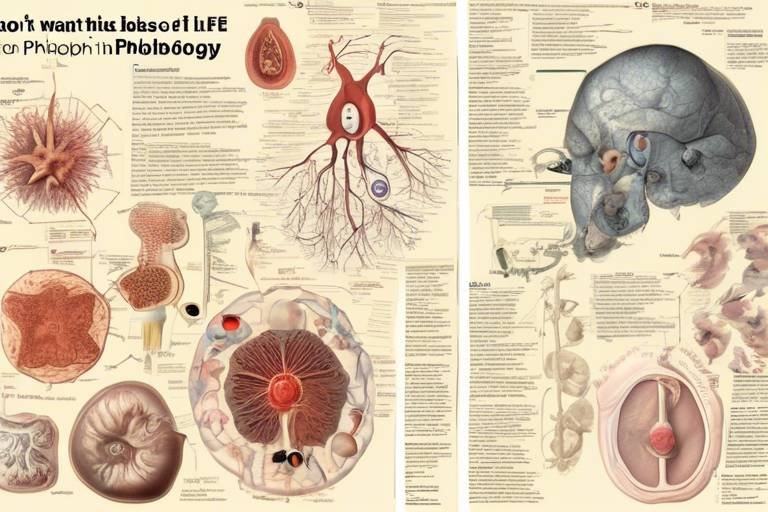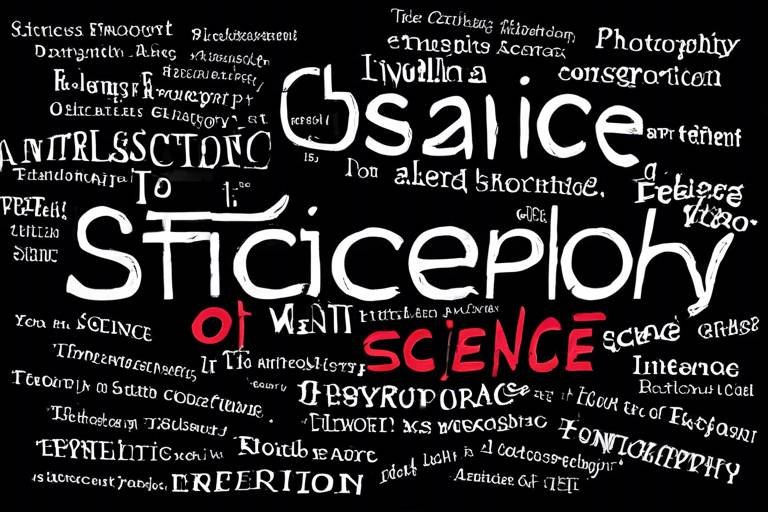Can We Understand Science without Philosophy?
Have you ever pondered whether we can truly grasp the complexities of science without the guiding light of philosophy? It’s a question that strikes at the heart of how we perceive knowledge, understanding, and the very fabric of reality. Science, with its rigorous methodologies and empirical data, seems at first glance to stand alone, a fortress built on observation and experimentation. Yet, when we dig deeper, we uncover a rich tapestry woven with philosophical threads that challenge, support, and ultimately enrich scientific inquiry.
Imagine science as a vast ocean, teeming with discoveries and innovations. Now, picture philosophy as the lighthouse guiding ships through this ocean. Without that light, would those ships navigate safely, or would they run aground on unseen rocks? Philosophy offers the foundational principles that shape our understanding of scientific concepts, addressing profound questions about the nature of knowledge, existence, and the scientific method itself. It prompts us to ask: What does it mean to know something? How do we differentiate between belief and knowledge? These inquiries are not just academic—they are essential for anyone hoping to grasp the essence of scientific endeavors.
Consider the scientific method, the cornerstone of scientific inquiry. It’s not merely a series of steps; it’s a philosophical framework that guides researchers in formulating hypotheses, conducting experiments, and interpreting results. Without philosophical inquiry, the scientific method risks becoming a mechanical process devoid of meaning. This interplay between philosophy and science is not just a historical curiosity; it remains relevant today as we grapple with complex issues like climate change, genetic engineering, and artificial intelligence.
In this article, we will embark on a journey to explore the intricate relationship between science and philosophy. We’ll delve into historical perspectives, examine influential figures, and discuss the challenges of separating these two fields. By the end, we hope to illustrate that understanding science without philosophy is like trying to navigate that vast ocean without a compass—possible, but fraught with peril and uncertainty.
- What is the relationship between science and philosophy? Science and philosophy are intertwined; philosophy provides the foundational principles that inform scientific inquiry and understanding.
- Can science exist without philosophy? While science can operate independently, philosophical frameworks are essential for deeper comprehension and ethical considerations in scientific practice.
- How has philosophy influenced modern science? Philosophical movements have shaped contemporary debates around scientific realism, methodology, and ethical dilemmas in research.

The Role of Philosophy in Science
Philosophy and science are like two sides of the same coin, intricately linked and mutually dependent. At its core, philosophy provides the foundational principles that shape scientific inquiry. It addresses profound questions about the nature of knowledge, existence, and the methodologies that scientists use to explore the universe. Without philosophy, we might find ourselves lost in a sea of empirical data without a compass to guide our understanding.
One of the critical roles philosophy plays in science is in the formulation of the scientific method. This method is not just a collection of steps; it's a philosophical framework that dictates how we approach questions and seek answers. For instance, consider the classic scientific method steps: observation, hypothesis, experimentation, and conclusion. Each step is underpinned by philosophical considerations about what constitutes evidence, how we define a hypothesis, and what it means to verify a theory. In this way, philosophy acts as the bedrock of scientific inquiry, ensuring that our pursuit of knowledge is not just a mechanical process but a thoughtful exploration of reality.
Moreover, philosophy encourages scientists to think critically about their assumptions. It prompts questions such as: What is the nature of reality? Can we ever truly know anything? Are our observations influenced by our perceptions? These questions may seem abstract, but they have practical implications. For example, the philosophical debate surrounding realism and anti-realism influences how scientists interpret their findings. If one believes that the universe exists independently of our observations, they might approach their research differently than someone who thinks our perceptions shape reality. This philosophical stance can affect everything from the design of an experiment to the interpretation of its results.
Additionally, philosophy helps scientists navigate the ethical landscape of their work. In an age where technology advances rapidly, ethical dilemmas arise frequently. Issues such as genetic engineering, climate change, and artificial intelligence require a philosophical lens to evaluate the implications of scientific discoveries. Philosophers provide frameworks for considering the moral dimensions of scientific work, guiding researchers to consider not just what they can do, but what they should do.
In summary, the role of philosophy in science is multifaceted and vital. It shapes the scientific method, encourages critical thinking, and provides ethical guidance, ensuring that our quest for knowledge is both rigorous and responsible. As we continue to push the boundaries of what we know, the interplay between science and philosophy will only grow more significant, reminding us that understanding the universe is as much about asking the right questions as it is about finding the right answers.
- What is the relationship between science and philosophy? Science relies on philosophical principles to shape its methodologies and ethical considerations.
- How does philosophy influence scientific research? Philosophy encourages critical thinking and helps researchers formulate hypotheses and interpret results.
- Why is ethics important in science? Ethical considerations guide scientists in making responsible decisions about their research and its implications.

Historical Perspectives
The interplay between science and philosophy has a rich history that dates back to ancient civilizations. Think about it: the great minds of the past, such as Aristotle and Descartes, didn't just dabble in one field; they wove together the threads of philosophy and science, creating a tapestry that has influenced generations. Philosophy has acted as the bedrock upon which scientific inquiry is built, tackling profound questions about existence, knowledge, and the very essence of reality. For instance, Aristotle's concept of empiricism laid the groundwork for the scientific method, emphasizing observation as a means to gain knowledge. His belief that knowledge comes from sensory experiences is a principle that continues to resonate in modern scientific practices.
As we dive deeper into history, we encounter the revolutionary ideas of René Descartes, whose famous dictum “I think, therefore I am” not only questions existence but also emphasizes the importance of doubt and inquiry. Descartes' analytical approach to understanding the world introduced a new way of thinking, where questioning and reasoning became pivotal in scientific exploration. His work on the mathematical foundations of physics, particularly in mechanics, paved the way for future scientific advancements.
Fast forward to the 17th century, and we find ourselves amidst a philosophical storm between two titans: Isaac Newton and Gottfried Wilhelm Leibniz. Their fierce debate over the invention of calculus symbolizes the clash of philosophical ideas within scientific development. Newton, with his emphasis on absolute space and time, stood in stark contrast to Leibniz's relational perspective, which viewed space and time as a network of relations. This philosophical divergence didn’t just shape their mathematical theories; it also influenced how future scientists approached the understanding of motion and change. The conflict between their ideas serves as a reminder of how philosophical frameworks can guide, and sometimes hinder, scientific progress.
To illustrate the impact of these historical perspectives, consider the following table that highlights key philosophers and their contributions to science:
| Philosopher | Key Contributions | Influence on Science |
|---|---|---|
| Aristotle | Empiricism, Natural Philosophy | Foundation of the scientific method |
| Descartes | Analytical Geometry, Rationalism | Questioning and reasoning in science |
| Newton | Laws of Motion, Universal Gravitation | Mathematical framework for physics |
| Leibniz | Calculus, Relational Space | Alternative views on motion and change |
These historical figures not only contributed to scientific knowledge but also shaped the philosophical discourse surrounding it. Their ideas continue to echo in modern discussions about the nature of scientific inquiry and the philosophical underpinnings that guide it. As we reflect on these historical perspectives, it's clear that science and philosophy have been inextricably linked, each influencing the other in profound ways. This interconnectedness challenges us to consider whether we can fully grasp scientific concepts without acknowledging the philosophical questions that accompany them.

Case Study: Newton and Leibniz
The intellectual rivalry between Isaac Newton and Gottfried Wilhelm Leibniz over the invention of calculus is a fascinating example of how philosophical differences can shape scientific development. Both men, working independently in the late 17th century, developed their own notations and approaches to calculus, which led to a heated dispute that extended beyond mere mathematical techniques into the realms of philosophy and epistemology.
Newton's approach was deeply rooted in his physical theories, emphasizing the importance of motion and forces. He viewed calculus as a means to describe change in physical systems, which was aligned with his broader scientific goals. For Newton, calculus was not just a mathematical tool; it was a fundamental part of understanding the universe's workings. His philosophical stance was that mathematics should be grounded in the physical world, a perspective that reflects a more empiricist approach.
On the other hand, Leibniz approached calculus from a more abstract standpoint. He introduced the integral and differential notations that we still use today, focusing on the conceptual underpinnings of mathematics. Leibniz believed that mathematics could be a language in its own right, capable of expressing ideas independently of physical phenomena. This philosophical viewpoint aligns more closely with rationalism, suggesting that mathematical truths exist in their own realm, waiting to be discovered.
The conflict escalated when both sides accused each other of plagiarism, leading to a bitter feud that not only impacted their reputations but also the development of mathematics itself. This case serves as an illustration of how philosophical beliefs can influence scientific discourse and the evolution of ideas. The differences between Newton's and Leibniz's philosophies highlight a critical question: Can we separate the scientific from the philosophical?
To further understand their contributions, it’s essential to look at the key differences in their approaches:
| Aspect | Isaac Newton | Gottfried Wilhelm Leibniz |
|---|---|---|
| Philosophical Approach | Empiricism | Rationalism |
| Focus of Calculus | Physical Motion | Abstract Concepts |
| Notation | Fluxions | Integral and Differential Notations |
| Impact on Science | Foundational for Classical Physics | Influential in Mathematical Logic |
This case study not only showcases the individual brilliance of Newton and Leibniz but also emphasizes the interconnectedness of philosophy and science. Their conflicting views on calculus illustrate how philosophical frameworks can shape scientific inquiry, leading to profound implications for how we understand the world. Ultimately, their rivalry pushed the boundaries of mathematics and physics, demonstrating that the relationship between science and philosophy is anything but straightforward.

Philosophy of Mathematics
The delves into the fundamental nature and implications of mathematical concepts, exploring questions that go beyond mere calculations and formulas. At its core, this branch of philosophy examines what mathematics is, how it relates to reality, and whether mathematical truths are discovered or invented. Imagine mathematics as a vast ocean; while we can skim its surface with basic arithmetic, the deeper we dive, the more we encounter profound philosophical questions that can reshape our understanding of the universe.
One of the primary debates in the philosophy of mathematics is between realism and nominalism. Realists argue that mathematical entities, such as numbers and shapes, exist independently of human thought. They claim that these entities are discovered rather than created. On the other hand, nominalists contend that mathematics is merely a linguistic construct, a tool we use to describe patterns and relationships in the world around us. This philosophical dichotomy raises intriguing questions: Are numbers mere symbols on a page, or do they possess an existence of their own?
To further illustrate the complexity of this philosophical field, consider the following table that outlines key positions in the philosophy of mathematics:
| Position | Description |
|---|---|
| Platonism | Mathematical entities exist in an abstract realm, independent of human thought. |
| Formalism | Mathematics is a manipulation of symbols according to agreed-upon rules, without intrinsic meaning. |
| Intuitionism | Mathematics is a mental construct, emphasizing the role of human intuition in understanding mathematical truths. |
| Constructivism | Only mathematical objects that can be explicitly constructed are considered valid. |
These philosophical perspectives not only challenge our understanding of mathematics but also influence scientific reasoning. For instance, if we adopt a Platonist view, we might believe that mathematical laws govern the universe, leading scientists to seek mathematical explanations for natural phenomena. Conversely, a formalist approach may lead to a more pragmatic view, where mathematics is seen as a convenient language for communicating scientific ideas rather than a reflection of reality.
Moreover, the philosophy of mathematics has significant implications for fields such as physics and computer science. In physics, the reliance on mathematical models to describe the laws of nature raises questions about the relationship between the abstract world of mathematics and the physical universe. Similarly, in computer science, the foundations of algorithms and computational theory are steeped in mathematical philosophy, prompting debates about the limits of computation and the nature of mathematical proof.
Ultimately, the philosophy of mathematics invites us to reflect on our own understanding of reality. It challenges us to consider whether mathematics is merely a tool or a lens through which we can perceive the universe. As we navigate this intricate landscape, we find that philosophy not only enriches our comprehension of mathematics but also enhances our ability to engage with the scientific world.
- What is the philosophy of mathematics? The philosophy of mathematics explores the nature, foundations, and implications of mathematical concepts, asking whether they are discovered or invented.
- Why is the philosophy of mathematics important? Understanding the philosophy of mathematics helps us grasp the relationship between mathematical theories and their application in the real world, influencing scientific reasoning.
- What are some key positions in the philosophy of mathematics? Key positions include Platonism, Formalism, Intuitionism, and Constructivism, each offering different perspectives on the existence and role of mathematical entities.

Impact on Scientific Methodology
When we dive into the impact of philosophy on scientific methodology, we're not just scratching the surface; we're exploring the very essence of how science operates. Philosophy isn't just an abstract concept; it serves as a guiding light that shapes the way scientists approach their work. Think of it as the blueprint for a building—without it, the structure may stand, but it’s unlikely to be stable or functional. The philosophical underpinnings of science influence everything from how hypotheses are formulated to how experiments are conducted and results interpreted.
At its core, the scientific method is a systematic way of learning about the world, and it relies heavily on philosophical inquiry. For instance, the formulation of a hypothesis is not merely a guess; it’s a statement grounded in theoretical frameworks that stem from philosophical thought. This process involves asking questions like: What do we know?, How do we know it?, and What assumptions are we making? These queries are philosophical in nature and crucial for establishing a solid foundation for scientific exploration.
Moreover, the way scientists conduct experiments is deeply intertwined with their philosophical beliefs. For example, the principle of falsifiability, proposed by philosopher Karl Popper, posits that for a hypothesis to be considered scientific, it must be testable and refutable. This idea has significant implications for how scientists design their experiments. They must create conditions under which their hypotheses can be disproven, thereby ensuring that their findings are not just coincidental but are based on rigorous testing.
Additionally, the interpretation of results is also influenced by philosophical perspectives. Scientists often grapple with the question of what their data actually means. Are they observing a causal relationship or merely a correlation? This distinction is not just a matter of statistical analysis; it involves a philosophical understanding of causation and correlation, which can lead to vastly different conclusions. Thus, the interplay between philosophy and scientific methodology is not just significant; it is essential.
To illustrate this further, let's consider a table that summarizes how different philosophical perspectives can influence various aspects of the scientific method:
| Philosophical Perspective | Impact on Hypothesis Formulation | Impact on Experimentation | Impact on Results Interpretation |
|---|---|---|---|
| Empiricism | Focus on observable phenomena | Emphasis on experimentation and observation | Reliance on data and empirical evidence |
| Logical Positivism | Hypotheses must be verifiable | Preference for quantitative methods | Focus on logical consistency |
| Constructivism | Understanding is socially constructed | Incorporation of context in experiments | Interpretation influenced by societal factors |
This table highlights how philosophical perspectives can shape the scientific process in various ways. In essence, philosophy not only enriches our understanding of science but also challenges us to think critically about the methods we use to explore the natural world. As we continue to advance in scientific knowledge, the dialogue between science and philosophy remains vital, ensuring that we do not lose sight of the fundamental questions that drive our quest for understanding.
- How does philosophy influence scientific inquiry? Philosophy provides the foundational principles that guide the formulation of hypotheses, experimental design, and interpretation of results.
- Can science exist without philosophy? While science can function independently to some extent, a comprehensive understanding of scientific concepts often requires philosophical reflection.
- What is the role of ethics in scientific methodology? Ethical considerations, grounded in philosophical inquiry, play a crucial role in guiding scientific research and addressing dilemmas that arise in various fields.

Modern Philosophical Influences
In the ever-evolving landscape of science, play a pivotal role in shaping the frameworks we use to understand the universe. Just like the lens of a camera focuses light to create a clear image, philosophy helps us focus our thoughts on the complexities of scientific inquiry. Movements such as logical positivism and post-positivism have emerged as significant philosophical undercurrents that challenge and refine our understanding of scientific realism and theories of truth.
Logical positivism, which gained traction in the early 20th century, emphasizes the importance of empirical evidence and the verifiability of statements. Imagine trying to navigate through a foggy landscape; logical positivism acts as a guiding light, allowing scientists to distinguish between meaningful scientific claims and those that are purely speculative. This philosophical stance asserts that only statements verifiable through direct observation or logical proof hold significance, thereby steering scientific debates toward a more rigorous methodology.
On the other hand, post-positivism acknowledges the limitations of strict empiricism, recognizing that our understanding of reality is often mediated by our perceptions and biases. It invites us to consider the broader context in which scientific inquiry occurs, much like viewing a painting from different angles to appreciate its full depth and nuance. This philosophical approach encourages a more flexible interpretation of scientific theories, allowing for the incorporation of social, cultural, and ethical dimensions into scientific discourse.
Furthermore, contemporary philosophy prompts scientists to engage with profound questions about the nature of reality and existence. For instance, the debate surrounding scientific realism challenges us to consider whether scientific theories accurately describe the world or merely serve as useful tools for predicting phenomena. This ongoing dialogue between science and philosophy enriches our understanding and stimulates critical thinking, pushing the boundaries of what we know.
To illustrate these influences, consider the following table that outlines key philosophical movements and their impact on scientific thought:
| Philosophical Movement | Key Ideas | Impact on Science |
|---|---|---|
| Logical Positivism | Emphasis on empirical verification | Focus on testable claims and observable phenomena |
| Post-Positivism | Recognition of theory-laden observations | Encourages consideration of context and biases |
| Constructivism | Knowledge is constructed socially | Highlights the role of community in scientific knowledge |
| Feminist Epistemology | Critique of traditional science as male-centered | Promotes diversity in scientific perspectives |
As we delve deeper into the relationship between science and philosophy, it's clear that these modern influences are not just abstract concepts; they profoundly affect how we approach scientific research and interpretation. The interplay between these fields is akin to a dance, where each partner influences the other's movements, leading to a more nuanced understanding of the world around us.
- What is the significance of philosophy in scientific inquiry? Philosophy provides the foundational principles that help scientists formulate hypotheses and interpret results, making it essential for a comprehensive understanding of science.
- How do modern philosophical movements influence scientific thought? Movements like logical positivism and post-positivism shape how we perceive the validity of scientific claims and the nature of truth, encouraging critical examination of scientific practices.
- Can science exist independently of philosophy? While science can operate on empirical data, the philosophical underpinnings are crucial for addressing deeper questions about knowledge and existence, suggesting that science and philosophy are deeply interconnected.

Challenges of Separation
When we talk about the challenges of separating science from philosophy, we dive into a complex web of ideas that intertwine both disciplines. Imagine trying to untangle a ball of yarn—each strand represents a different concept, and as you pull one, others inevitably come along for the ride. The reality is that many scientific concepts are deeply rooted in philosophical thought, making it nearly impossible to extract one without affecting the other.
One of the main issues arises from the oversimplification of scientific concepts. When we attempt to isolate scientific inquiry from philosophical underpinnings, we risk reducing complex ideas into mere facts devoid of context. For instance, consider the nature of scientific theories. These are not just collections of data; they are frameworks built upon assumptions, interpretations, and philosophical debates about what constitutes knowledge. Without recognizing this, we may misinterpret the very essence of scientific inquiry.
Furthermore, this separation can lead to a decline in scientific literacy. If students and the general public are taught science in a vacuum, devoid of its philosophical context, they may struggle to grasp the nuances of scientific debates. This lack of understanding can foster skepticism towards science, as individuals may question the validity of findings without appreciating the philosophical discussions that inform them. For example, when discussing climate change, a purely scientific approach may fail to address the ethical implications, leading to polarized views.
Additionally, the challenges of separation are evident in the ongoing debates between reductionism and holism. Reductionism seeks to understand complex systems by breaking them down into their constituent parts, while holism emphasizes the importance of viewing systems as a whole. Both perspectives stem from different philosophical traditions, and choosing one over the other can significantly impact scientific research. In fields such as ecology or psychology, where interactions among components are crucial, a reductionist approach might overlook vital relationships, leading to incomplete conclusions.
Moreover, the ethical considerations in science further complicate the separation. Questions surrounding genetic engineering or artificial intelligence are not just scientific queries; they are steeped in philosophical discussions about morality, responsibility, and the definition of humanity. The implications of scientific advancements often necessitate a philosophical lens to understand the broader impact on society. As we navigate these uncharted waters, the absence of philosophical reflection can result in hasty decisions that have long-term consequences.
In summary, the challenges of separating science from philosophy are multifaceted and profound. The intertwining nature of these fields calls for a collaborative approach, where philosophical inquiry enriches scientific understanding. By embracing this interconnectedness, we can foster a more nuanced appreciation of both disciplines, ultimately leading to a more informed society.
- Why is philosophy important for understanding science? Philosophy helps frame the questions that science seeks to answer and provides a context for interpreting scientific findings.
- Can science exist without philosophy? While science can operate independently to some extent, many foundational principles and ethical considerations are rooted in philosophical thought.
- How do reductionism and holism differ in scientific approaches? Reductionism breaks down complex systems into smaller parts, while holism emphasizes the importance of understanding systems as a whole.
- What role does ethics play in scientific research? Ethics guides scientists in making responsible decisions regarding research practices, especially in sensitive areas like genetic engineering and environmental impact.

Reductionism vs. Holism
When diving into the fascinating world of science, one cannot help but stumble upon the age-old debate of reductionism versus holism. These two philosophical approaches offer contrasting views on how we understand complex systems. Imagine trying to assemble a jigsaw puzzle: reductionism is akin to examining each piece in isolation, believing that by understanding the individual parts, you can grasp the entire picture. On the other hand, holism suggests that you should step back and view the entire puzzle as a cohesive whole, recognizing that the interplay between the pieces is crucial for understanding the broader image.
Reductionism has its roots in the scientific method, where scientists often break down phenomena into their simplest components to study them effectively. This approach has been immensely successful in fields such as biology and chemistry, where understanding molecular structures or cellular functions can lead to breakthroughs in medicine and technology. For instance, by isolating a specific gene, researchers can develop targeted therapies for diseases, showcasing the power of reductionist thinking.
However, this method has its limitations. Critics argue that reductionism can lead to an oversimplified view of complex systems. Take, for example, the study of ecosystems. If we only focus on individual species without considering their interactions and relationships within the ecosystem, we risk missing critical insights into biodiversity and environmental health. This is where holism shines, advocating for a more integrated approach that considers the intricate web of relationships among components.
To illustrate this further, consider the following table that summarizes the key differences between reductionism and holism:
| Aspect | Reductionism | Holism |
|---|---|---|
| Focus | Individual components | Whole systems |
| Methodology | Breaking down complex phenomena | Studying interactions and relationships |
| Applications | Biochemistry, genetics | Ecology, psychology |
| Strengths | Precision, clarity | Comprehensive understanding |
| Weaknesses | Oversimplification | Complexity may obscure details |
In many scientific disciplines today, a blend of both reductionist and holistic approaches is often employed. For example, in systems biology, researchers utilize reductionist techniques to understand individual components of biological systems while simultaneously considering the interactions and networks that govern these components. This integrated approach enhances our understanding of complex biological processes, from cellular functions to entire ecosystems.
Ultimately, the reductionism versus holism debate highlights the importance of perspective in scientific inquiry. While both approaches have their merits, the key takeaway is that a comprehensive understanding of complex systems often requires a balance between the two. Just like in life, where we must consider both the details and the bigger picture, science thrives on the interplay between reductionism and holism.

Ethical Considerations in Science
When we delve into the realm of science, it’s impossible to ignore the ethical considerations that accompany it. Science is not just about uncovering facts; it’s also about understanding the implications of those facts on society, the environment, and humanity as a whole. Take a moment to think about it: every scientific advancement, from medical breakthroughs to technological innovations, carries with it a moral weight. This intersection of science and ethics is crucial, as it helps guide researchers and practitioners in making decisions that are not only scientifically sound but also socially responsible.
One of the primary ethical dilemmas in science revolves around human experimentation. Historically, there have been instances where the quest for knowledge led to gross violations of human rights. The infamous Tuskegee Syphilis Study, for example, highlighted the necessity for strict ethical guidelines in research involving human subjects. Today, ethical review boards and informed consent processes are in place to protect participants, but the question remains: how do we balance the pursuit of knowledge with respect for individual rights?
Moreover, the rapid advancement of technology brings forth new ethical challenges. Consider genetic engineering and CRISPR technology. While these innovations hold the promise of eradicating genetic diseases, they also raise profound questions about the limits of human intervention in nature. Should we have the power to alter the human genome? What are the long-term implications of such modifications? These questions are not merely scientific; they are deeply philosophical, requiring us to reflect on our values and the kind of future we envision.
In addition to human subjects, ethical considerations extend to environmental impacts. The scientific community has a responsibility to consider how research and technological advancements affect the planet. For instance, the debate over climate change is not just a scientific issue; it's an ethical one. Scientists must grapple with the consequences of their findings and the potential actions that may arise from them. Are we willing to sacrifice certain ecosystems for the sake of progress? How do we ensure sustainability while pursuing scientific advancement?
Furthermore, the role of ethics in science also encompasses the responsibility of scientists to communicate their findings accurately and transparently. Misrepresentation of data, whether intentional or accidental, can lead to public distrust and skepticism towards science. This is particularly critical in today’s information age, where misinformation spreads like wildfire. Scientists must not only be diligent in their research but also in how they present their findings to the public. This includes acknowledging uncertainties and potential biases in their work.
To encapsulate the importance of ethical considerations in science, let’s look at a few key areas:
- Human Rights: Ensuring the dignity and rights of all individuals involved in scientific research.
- Environmental Stewardship: Assessing the ecological impacts of scientific advancements.
- Honesty in Communication: Maintaining transparency and accuracy in the dissemination of scientific knowledge.
- Public Engagement: Involving the community in discussions about the ethical implications of scientific research.
Ultimately, the ethical considerations in science are not just an afterthought; they are integral to the scientific process itself. As we continue to push the boundaries of knowledge, we must remain vigilant about the moral implications of our work. The dialogue between science and ethics is ongoing, and it is one that requires participation from scientists, ethicists, and the public alike. By fostering this dialogue, we can ensure that science serves not only the pursuit of knowledge but also the betterment of society.
Q: Why are ethical considerations important in scientific research?
A: Ethical considerations ensure that research is conducted responsibly, respecting human rights and the environment, while also maintaining public trust in scientific findings.
Q: How do ethical guidelines protect human subjects in research?
A: Ethical guidelines, such as informed consent and institutional review boards, help protect participants from harm and ensure they are fully aware of the research implications.
Q: What role does public engagement play in ethical science?
A: Public engagement fosters transparency and accountability, allowing communities to voice their concerns and perspectives on scientific research and its implications.

Conclusion: Interconnectedness of Science and Philosophy
In wrapping up our exploration of the intricate relationship between science and philosophy, it becomes abundantly clear that these two fields are not merely parallel tracks but rather intertwined paths that enhance our understanding of the universe. The interconnectedness of science and philosophy is akin to the relationship between a compass and a map; one provides direction while the other offers context. Without philosophical inquiry, scientific endeavors risk becoming mere data collection exercises devoid of meaning, while philosophy without scientific grounding can drift into abstract speculation, losing touch with reality.
Moreover, the philosophical frameworks that underpin scientific methodologies play a crucial role in shaping how we interpret data, formulate hypotheses, and draw conclusions. For instance, the debates surrounding scientific realism and the nature of truth are not just academic discussions; they have real-world implications that affect everything from environmental policy to medical ethics. As we navigate complex issues like climate change or genetic engineering, the philosophical underpinnings of our scientific understanding become paramount. They guide us in making ethical decisions that resonate with our values and societal norms.
To illustrate this point, consider the following table summarizing the key areas where science and philosophy intersect:
| Area of Intersection | Scientific Perspective | Philosophical Insight |
|---|---|---|
| Scientific Methodology | Empirical data collection and experimentation | Epistemology and the nature of knowledge |
| Ethics in Research | Guidelines for conduct and practice | Normative theories and moral implications |
| The Nature of Reality | Understanding physical phenomena | Metaphysics and the essence of existence |
| Mathematics in Science | Quantitative analysis and modeling | Philosophy of mathematics and its foundations |
Ultimately, the relationship between science and philosophy is not just an academic curiosity; it is a vital dialogue that shapes our understanding of the world. By engaging with both fields, we can cultivate a more nuanced perspective that embraces complexity and encourages critical thinking. So, the next time you find yourself pondering a scientific question, take a moment to reflect on the philosophical implications behind it. You might just discover that the answers lie not only in the data but also in the deeper questions we ask.
- Why is philosophy important for science? Philosophy provides the foundational principles that guide scientific inquiry and helps clarify the implications of scientific findings.
- Can science exist without philosophy? While science can operate independently to some extent, a lack of philosophical reflection may lead to a superficial understanding of scientific concepts.
- How do ethical considerations influence scientific research? Ethical frameworks derived from philosophical thought guide scientists in making responsible choices that consider the implications of their work on society and the environment.
- What role does mathematics play in the relationship between science and philosophy? Mathematics serves as a language for expressing scientific theories, and its philosophical implications can affect how we interpret and understand scientific phenomena.
Frequently Asked Questions
- Can science exist without philosophy?
While science can operate independently in terms of conducting experiments and gathering data, philosophy provides the essential framework that helps us understand the implications and meanings behind scientific discoveries. Without philosophy, we might miss the bigger picture!
- How does philosophy influence scientific methodology?
Philosophy shapes the scientific method by offering insights into how we form hypotheses, design experiments, and interpret results. It encourages critical thinking and helps scientists ask the right questions, ensuring that research is grounded in sound reasoning.
- What role did historical figures like Aristotle and Descartes play in science?
Aristotle and Descartes laid the groundwork for scientific thought by introducing key philosophical concepts. Their ideas about observation, reasoning, and the nature of existence influenced how science evolved, demonstrating that philosophy and science are deeply interconnected.
- How do ethical considerations in science relate to philosophy?
Philosophy is crucial in navigating ethical dilemmas in science, such as those surrounding genetic engineering and climate change. It helps frame discussions about what is right or wrong in scientific practices, ensuring that research aligns with societal values.
- What is the difference between reductionism and holism in science?
Reductionism focuses on breaking complex systems into their smaller parts for analysis, while holism emphasizes understanding systems as a whole. This philosophical debate affects how scientists approach research and interpret complex phenomena.
- Why is philosophical inquiry important for scientific literacy?
Philosophical inquiry enhances scientific literacy by encouraging individuals to think critically about scientific claims and methodologies. It empowers people to understand the underlying principles of science, fostering a more informed public.
- How do modern philosophical movements impact science today?
Contemporary philosophical movements like logical positivism and post-positivism influence current debates in science, particularly around issues of scientific realism and the nature of truth. These discussions help refine scientific practices and theories.



















